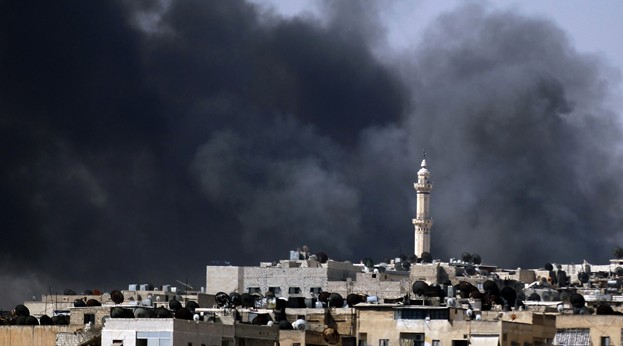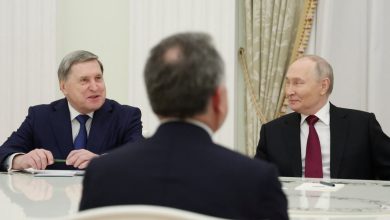Aleppo as attack helicopters and fighter jets pound rebel positions.
The noise and the percussion waves from the explosions are sickening. Day and night.
Helicopters strafe Fee Syrian Army (FSA) fighter positions while selecting targets for the Russian-made MIG jets’ continuous sorties.
In the target zones, where they are strongest, the FSA scamper to hide their spoils.
A tank is moved under the dubious protection of a tree line while trucks with heavy machine guns bolted to the back, career around the streets in a deadly game of cat and mouse; trying to claim the prize of a jet while still staying alive.
In the midst of this millions of people remain in greater Aleppo.
Many have gone or are trying to; loading up cars and flatbeds with all their possessions and heading out of town through the fighting. But they remain a minority.
Most are struggling to continue to live in the embattled city. They queue for bread for a minimum of three hours at a time.
Armed FSA fighters maintain order in the bread lines, while inside the few bakeries working they urge the packers to work more quickly.
Basic foodstuffs and fuel have rocketed in price; only the bread remains at a set figure and only because the FSA is keeping the price down.
They are scared that if they are even seen with foreigners they will be labelled as supporters of the revolution if the army takes control of the city; most think it inevitable.
“I have seven children, no money, no car, no way to leave,” one man told me. He speaks for thousands.
The aerial attacks seem to be a precursor to a greater assault on the city by Syrian forces.
As many as 20,000 soldiers are reported to have been deployed from around the country to retake all of Aleppo. They are supported by tanks, artillery and of course from the skies.
In the former headmaster’s office of a school, now the central command centre for the FSA, I met the two main commanders for the FSA in Aleppo and its surrounding districts.
Hajji Mare and Hajji Tar Afat, names depicting their home towns, have taken on an almost mythical status amongst the FSA. They have overseen the infiltration of the city and masterminded its defence.
Both businessmen, they have no military experience; but they command, with calm authority, fighters with undying loyalty.
“We hope to hold on but it is going to be very difficult,” Hajji Mare conceded.
“But the Syrian army is being stretched. It is demoralised. They don’t want to come and fight. They are fighting in Homs, Hama, Dera, Idlib and Damascus, but the government has said that Aleppo is the most important. So it will be hard,” he said.
The civilian and FSA casualties from the aerial bombardment are growing.
In one incident 50 or 60 were hurt from flying shrapnel.
They are taken to one of the few working hospitals, the Accident and Emergency area awash with blood, as doctors who risk death for treating the FSA, deal with dozens at a time.
“I am here because of humanity,” a doctor told me. “We won’t bow to this regime.”
At night, risking government snipers, protesters take to the streets near the ancient Citadel at its centre. Many are very, very young and they are watched by an overwhelming number who simply don’t join in.
Prosperous Aleppo remained aloof from the revolution for a long time, but it is now at its very core.
The fate of this city and the government are entwined. The regime must win here and they likely will this time.
But the tipping point has been reached, Aleppo won’t stay with the government forever; it’s a matter of when, not if it falls, along with Basher al Assad.
[media id=572 width=610 height=340]

